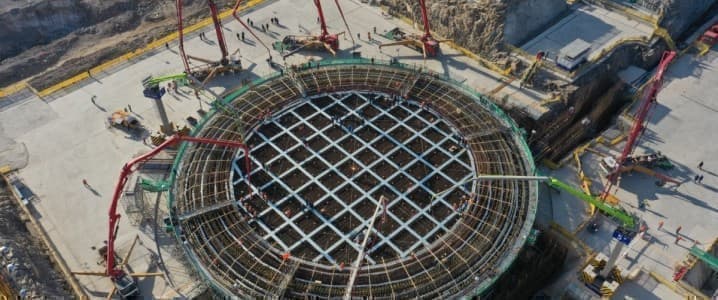The Shidaowan nuclear power plant, which features the world’s first fourth-generation reactor, started commercial operations on December 6, China National Nuclear Corporation (CNNC), one of the project’s developers, said.
“China’s independently developed high-temperature gas-cooled reactor demonstrator commenced commercial operation,” CNNC said in a statement.
“It signifies that China has completed the world’s first commercially operational modular nuclear power plant with fourth-generation nuclear technology, marking the transition of fourth-generation nuclear technology from experiments to the commercial market.”
Generation IV reactors are considered safer and more efficient.
“The tests confirmed that commercial-scale reactors could be cooled down naturally without emergency core cooling systems for the first time in the world. It is the so-called inherently safe reactor,” Tsinghua University, one of the joint developers of the reactor, said.
Such reactors can produce heat, electricity, and hydrogen and would help China and the world “become carbon neutral,” Zhang Zuoyi, dean of the Tsinghua University Institute of Nuclear and New Energy Technology and chief designer of the Shidaowan reactor project, told South China Morning Post.
The fourth-generation reactor in operation now puts China “ahead of other countries in terms of nuclear technology research and development,” Francois Morin, China director of industry group World Nuclear Association, told The Wall Street Journal.
According to Morin, Western countries are set to launch their fourth-generation nuclear reactors only in the early 2030s.
David Fishman, a China-based senior manager at energy consulting firm Lantau Group, told the Journal that “China is arguably peerless in actually building and commercializing next-generation nuclear power technology.”
Many countries in the West, with the notable exception of Germany, have recognized that nuclear power generation would help them achieve net-zero emission goals.
At the COP28 climate summit currently underway in Dubai, the United States and 21 other countries pledged to triple nuclear energy capacity by 2050, saying incorporating more nuclear power in their energy mix is critical for achieving their net zero goals in the coming decades.
The United States, alongside Britain, France, Canada, Sweden, South Korea, Ghana, and the United Arab Emirates (UAE), among others, signed the declaration at the COP28 climate summit.
“The Declaration recognizes the key role of nuclear energy in achieving global net-zero greenhouse gas emissions by 2050 and keeping the 1.5-degree Celsius goal within reach,” the U.S. Department of State said.
China is not a signatory to that declaration, but it aims to develop more nuclear energy capacities to reduce emissions as its demand for electricity rises. 
As of 2020, nuclear energy accounted for 5% of China’s generation mix, which continued to be dominated by coal, per data from the World Nuclear Association.
By 2035, nuclear energy is expected to make up 10% of the electricity generation mix and 18% by 2060, Chinese media quoted the China Nuclear Energy Association (CNEA) as saying earlier this year.
As of September 2023, China had 55 nuclear power units in operation with a combined installed capacity of 57 GW, and 24 units under construction with a total installed capacity of 27.8 GW, Xinhua quoted CNEA official Wang Binghua as saying. By 2060, that capacity is expected to jump to 400 GW, the official said.
China is also expected to approve six to eight nuclear power units each year “within the foreseeable future.”



I reject that framing. What I said was pointing out China’s legitimate concern for nuclear contamination in their waters, near waters, and the waters of the world which effect us all - namely the Pacific ocean. They clearly understand the risks associated with these plants, and they still build them. This is not racism, or jealousy, or some form of pvert nationalsim. This is critism of a risk assesment.
I don’t want or anyone else building these roulette machines either. This has nothing to do with “China bad.” No nation, engineering firm, or corporation is going to book smart out Murphy’s Law. They rolled that dice with Fukushima thinking what happened would never happen or the risks were too remote. It is simply a risk calculation that has played out multiple times in my life already, and even working / operating the reactors only made me see those risks more clearly to the point I switched careers. The industry itself is poisioned and deluded. Humans should move on from these devices. That is my random internet person assement.
or anyone else building these roulette machines either. This has nothing to do with “China bad.” No nation, engineering firm, or corporation is going to book smart out Murphy’s Law. They rolled that dice with Fukushima thinking what happened would never happen or the risks were too remote. It is simply a risk calculation that has played out multiple times in my life already, and even working / operating the reactors only made me see those risks more clearly to the point I switched careers. The industry itself is poisioned and deluded. Humans should move on from these devices. That is my random internet person assement.
There is no need to get into a personal accusatory slander or sea lioning troll fest over this.
I mean the alternative is the literal and guaranteed disruption of the planet’s ability to sustain human civilization. It would be nice if we could magic up enough energy to meet society’s demands or return to monke without hundreds of millions starving to death, but that’s not a real option.